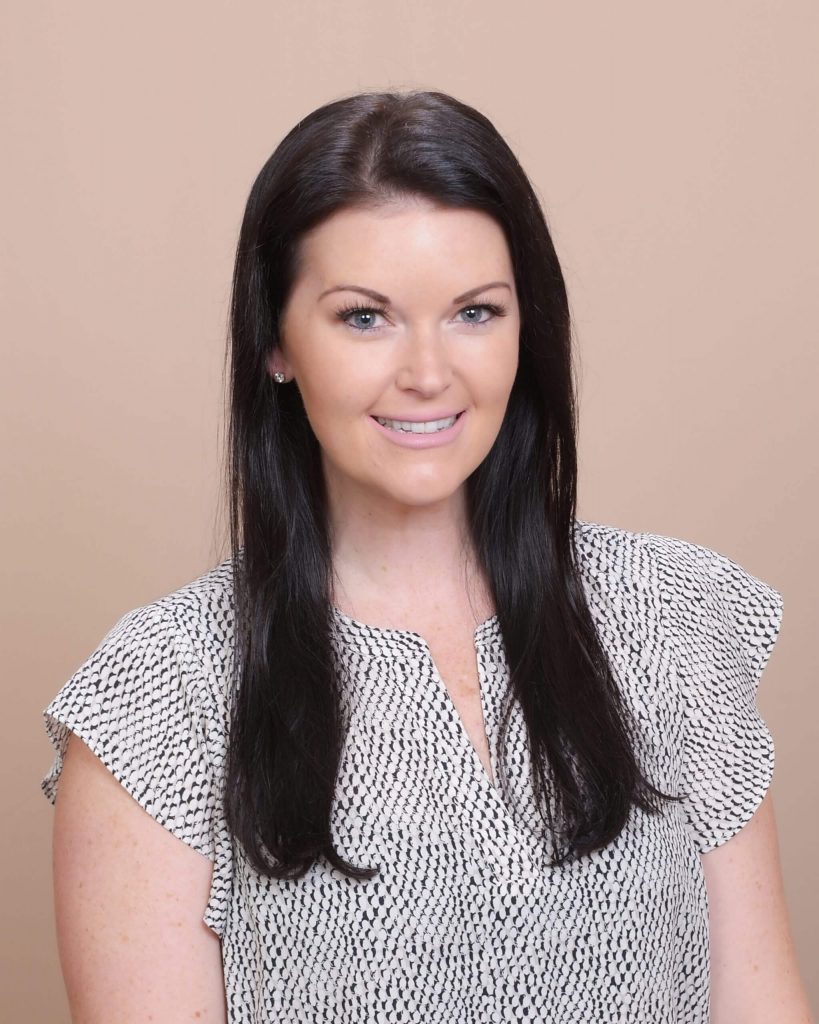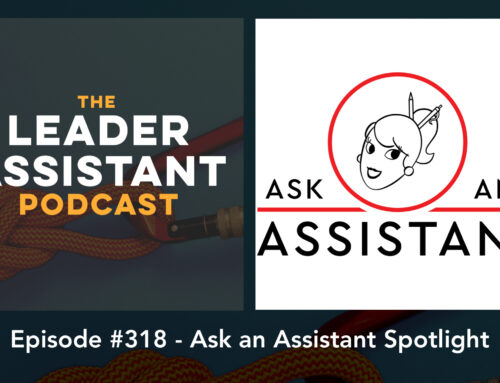Kaleen Skersies is the Executive Assistant to Terry Cook, Founding Partner & CEO, of Parcion Private Wealth. Prior to joining Parcion, Kaleen worked for multiple ultra high net worth (UHNW) individuals and has served in various capacities in the private service sector.

In this episode, Kaleen talks about what it’s like to work with ultra high net worth individuals, tips for project management, and how to distinguish between an individual contributor and a great leader.
LEADERSHIP QUOTE
But among you it will be different. Whoever wants to be a leader among you must be your servant.
– Matthew 20:26
CONNECT WITH KALEEN
ABOUT KALEEN
Kaleen is the Executive Assistant to Terry Cook, Founding Partner & CEO, of Parcion Private Wealth. Kaleen specializes in the holistic support of C-Suite executives as they lead their teams. Her areas of focus include project management, creating efficiencies, event planning, calendar management, and marketing strategy. Prior to joining Parcion, Kaleen worked for multiple UHNW individuals and has served in various capacities in the private service sector.
Originally from Seattle, Kaleen has lived in MT, CO, and WY. In her free time, she enjoys yoga, hiking, horseback riding, wine tasting, and traveling.
THE LEADER ASSISTANT PREMIUM MEMBERSHIP
Check out the Leader Assistant Premium Membership for ongoing training, coaching, and community.
LEADER ASSISTANT LIVE EVENTS
Check out our constantly updated schedule of events for admins and assistants at LeaderAssistantLive.com.
THE LEADER ASSISTANT BOOK
Download the first 3 chapters of The Leader Assistant: Four Pillars of Game-Changing Assistant for FREE here or buy it on Amazon or Audible.
JOIN THE FREE COMMUNITY
Join the Leader Assistant Global Community here, or the Facebook Group here for bonus content and to network with other assistants who are committed to becoming leaders!
SUBSCRIBE
Subscribe to The Leader Assistant Podcast so you don’t miss new episodes!
You can find the show on Apple Podcasts, Spotify, Google Podcasts, Pandora, and Stitcher.
Join my email list here if you want to get an email when a new episode goes live.
LEAVE A REVIEW
If you’re enjoying the podcast, please take 2 minutes to rate and review the show on Apple Podcasts here. Each review helps me stay motivated to keep the show going!
—
EPISODE TRANSCRIPT
Kaleen Skersies 0:00
This is Kaleen Skersies and today’s leadership quote comes from Matthew 2026. But among you, it will be different. Whoever wants to be a leader among you must be your servant.
Podcast Intro 0:15
The Leader Assistant Podcast exists to encourage and challenge assistance to become confident game changing leader assistance.
Jeremy Burrows 0:23
Thank you for listening to The Leader Assistant Podcast. Hey friends, thanks for tuning in to Episode 111. You can check out the show notes at leaderassistant.com/111. Before we jump into the interview, I wanted to invite you to join us at one of our upcoming events. Most of them are virtual at this time, but we will be doing in person events as soon as we are safely able. So leaderassistantlive.com, that’s leaderassistantlive.com. And you can check out our events. These events are in a variety of price points. So some of them are as affordable as $35. And some of them are more intense two day workshop type sessions that might cost 1500 to $2,500. But your executives and your companies can pay for it. And we even have a template to use where you can request the professional development funds to pay for your registration. So leaderassistantlive.com and we hope to see you at a future event. Hey friends, thanks for tuning in to The Leader Assistant Podcast. It’s your host Jeremy Burrows and today I’m speaking with Kaleen Skersies. Kaleen is executive assistant to the founding partner and CEO of Parseghian private wealth. Kaleen How’s it going?
Kaleen Skersies 1:53
It’s going well, thanks for having me, Jeremy.
Jeremy Burrows 1:56
Yeah, I’m excited to dive right in. Why don’t you tell us where you’re at in the world? And what your favorite hobby is?
Kaleen Skersies 2:05
All right. Um, I am well, Percy on spaced and Bellevue, Washington and I’m located this evening just north of downtown Seattle and shoreline. My freight favorite hobby. Definitely horseback riding. I love horses. I grew up riding them. And I wish I could get out of the city more often, to ride but I’ve been trying to prioritize that more and more as, as time goes by.
Jeremy Burrows 2:33
Awesome. Have you fallen off a horse before?
Kaleen Skersies 2:37
Oh, boy, multiple times. I’ve definitely been in the emergency room several times and had some long term injuries. But it doesn’t stop me from getting back on.
Jeremy Burrows 2:49
Wow, that’s That’s dedication.
Kaleen Skersies 2:52
It is you you know, when you find something you love, you just have to stick with it. So
Jeremy Burrows 2:58
awesome. Well, let’s get into your executive assistant career. You have worked in your prior roles. You’ve worked with ultra high net worth individuals, and then also in the private service sector. So tell us a little bit about how you got into the EEA role in specifically the ultra high net worth world?
Kaleen Skersies 3:25
Absolutely, it can. It can be a little daunting, I think to some people who who haven’t worked for high net worth individuals. But I’ve been very lucky and the people I’ve supported for the most part have been very down to earth and treat have treated me just as any other individual. I actually nannied for quite a while and split time between Seattle, Washington and Jackson Hole Wyoming, nannying for a couple of different families. And then from there, sort of moved into more of house management roles, managing multiple properties for high net worth individuals. And then I actually did a stint in Aspen, Colorado working as a personal assistant. So definitely more on the domestic side of supporting high net worth individuals. And the last five years have kind of transitioned more into traditional office space, supporting CEOs in their home offices. But as you know, in the executive assistant world, your you know, if you’re good at something, they they tend to keep adding to your plate. So it doesn’t matter if you’re supporting an individual and an office, you might be asked to do things but do involve their personal life. So that’s sort of where I’m at right now.
Jeremy Burrows 4:56
Yeah, that’s a good point. Did you clarify that? When you started with your current role, like, you know, or did they specifically say this is going to entail personal assistant stuff as well?
Kaleen Skersies 5:08
You know, I’ve learned that job descriptions basically have to be thrown out the window when you apply for any executive assistant role. Because really, what what the are the CEOs or executives that you’re supporting need from you is to show them what how you can add value. And I think, essentially, I’ve done so many things for a variety of different people that they just sort of expect that if you are able to do these things previously, that you’ll be able to continue to do them. I I did clarify in this role that you know, this would be a primarily supporting the the role I’m currently and that it would be supporting the executive within the office and helping the company grow. But as you know, it’s just those all those little things get weaseled in into your day or, you know, your CEO may have a million different things that need to be prioritized for him. And sometimes taking those personal things off of his or her plate is is really where you can add value.
Jeremy Burrows 6:20
So what’s one of the craziest things you’ve had to do? On the personal assistant side?
Kaleen Skersies 6:26
Oh, I love that question. I think, still to this day, the craziest thing I’ve been asked to do was source to Jack Russell puppies that were declawed. And the person I was supporting at the time wanted these puppies flown in on a private jet. So I was able to talk them out of getting this flight for them for the puppies just because I felt it was so unnecessary in the grand scheme of things. But I ended up having to use a puppy broker in order to find these Jack Russells. And that was just a really unique experience from start to finish.
Jeremy Burrows 7:12
Wow. So did you just start Googling? Or did you have kind of connections in your network to find that
Kaleen Skersies 7:18
there was one individual that I did reach out to within my network that was able to kind of guide me in that direction. But man, I don’t know what we did without Google. Because it was definitely helpful as well.
Jeremy Burrows 7:32
Yeah. Wow, that’s pretty intense. So okay, what’s the craziest thing you’ve done on the corporate side?
Kaleen Skersies 7:40
You know, what, honestly, I think, given the amount of personal assistant work that I’ve done, nothing fazes me on the corporate side,
Jeremy Burrows 7:49
on that side, right,
Kaleen Skersies 7:52
right. You know, I did unfortunately, support a CEO for a short period of time, who was going through a lot in his life. And we actually had some business partners fly in from Australia. And we had three full days of meetings and presentations lined up for these business partners. And then the CEO that I was supporting, was having some difficulty with another employee and and lost his cool and, unfortunately, just removed himself completely from the meetings. And our operations manager and myself ended up having to run those meetings for the rest of basically a full entire day. So that was just really a unexpected and very disappointing. But B, it was also nice to see how cohesive the senior ops person was alongside myself and able to take over just the CEO not being there in order to to keep our business partners happy and pacified and on track. And, you know, the reason they had come so far to have had these discussions.
Jeremy Burrows 9:10
So kind of on that note, do you do you have any formal like business training? Did you get your MBA or anything like that?
Kaleen Skersies 9:21
I do not have an MBA, I do have an undergrad just Business Management from Rocky Mountain College in Billings, Montana. And so that is definitely been useful, you know, setting setting myself up for just what what to to expect, I guess, being in the business world per se, but I learned by doing and I learned by watching and I learned by absorbing so some of those fundamentals you learned in college? Absolutely. You need to to know and learn and at Never undervalue a college education. But you cannot replace workplace experience you really can’t.
Jeremy Burrows 10:08
Yeah. And that’s, that’s why I was asking is, you know, you mentioned, basically you had to kind of hold down the fort when the CEO wasn’t there. And I feel like that’s typically and I’ve said this before on the podcast, but that’s typically a much better education in real world business than an MBA is.
Kaleen Skersies 10:27
Absolutely. And I say it now, I never want to be in that position again. But I know, when it kind of comes to fight or flight, I’m able to fight right. I’ve been in that situation before, and I think it helped also boost my confidence moving forward, just knowing I was able to have an intelligent conversation, a well informed conversation, and, and most importantly, the end result was positive for both parties.
Jeremy Burrows 10:59
Awesome. Well, let’s, let’s talk a little bit more about the high net worth support for a second because I know several of my listeners, personally, who support high net worth individuals, do you have any tips specifically for those supporting them, or maybe even tips on even how to get into like some some people, I know, it seemed like a impossible role to find sometimes, because those communities are pretty close knit, and protective, for obvious reasons. But any, any tips from that side of the world?
Kaleen Skersies 11:43
I think this, this just goes without saying is networking is so important. It does not matter what role you’re in today, tomorrow, 10 years from now, never stopped putting yourself in a place to network with individuals that might not be in the same realm as you currently are. But maybe one that you would love to be in. And then I also just think, never stop learning, right? I, I try to absorb as much as I can from the executives that I support. And you eventually start to think like them and speak like them and be like them, and they’re obviously well respected individuals. So just learning the vernacular that you, you know, you need to know moving forward, really sets you up for success. I don’t have any tips as far as sites to go to, I just have always utilized kind of a self awareness and guidance through everything that I’ve experienced, and just a lot of listening and observing, and then not being afraid to connect with those individuals on LinkedIn or, or reach out to their assistants or their gardeners or, you know, utilizing maybe the high net worth individuals, key players as your point of reference or contact to initiate maybe the initial entrance into the realm of high net worth individuals.
Jeremy Burrows 13:22
So what about security? How were you? And maybe even just privacy? How were you able to maintain that confidentiality? And, you know, I would, I would assume that you had to hire contractors or nannies or whoever, to come into the homes? How? How did you make sure that you’re bringing someone in that was that was respectful and safe?
Kaleen Skersies 13:52
Absolutely. You know, it really just dependent on who I was supporting at the time. Some people are far more relaxed, others have more of a formalized process. I think, obviously, vetting your vendors. First and foremost, some would have to sign NDAs as they, you know, would come onto the property or prior to coming onto the property, just depending on whoever I was supporting at the time. I think also, when you’re talking with a vendor or someone who’s coming on site to perform work, it’s really important that you keep the information that you’re giving the person strictly to whatever they’re there to focus on. So if I’m having a vendor come in to repair something in the kitchen, I don’t need to be talking about the security system because that just gives them more intel than they need to know about the individuals residence or office wherever it is. You might, you might have them come into.
Jeremy Burrows 14:54
Yeah, that’s a good, good tip. So you mentioned the A crazy request requests about the dogs? What were their requests, like outlandish requests that were made that you basically said no to or outsourced?
Kaleen Skersies 15:13
Jeremy, I’m not very good at saying no. That’s something that I’ve personally been working on, how do I say no in a kind way? Or how do I redirect a question or situation, I’m learning, especially in these last few years to say, I don’t have the answer or the solution for that, but I’m happy to find someone who does, because I can’t be an expert on everything. And I think a lot of the time, regardless, if you’re supporting someone on the personal side, or the executive side, they just want to know that the job is gonna get done. And the job will, you know, like they want it done yesterday, right sort of out of sight out of mind. They don’t honestly don’t care how it gets done, as long as it gets done for the most part. So there are times where, you know, I’m learning I have interns now that I am able sometimes to pass smaller items off to that are just as important as the larger items, I just don’t have the capacity to always take on everything my executive is throwing my way.
Jeremy Burrows 16:20
So let’s kind of transition a little bit to the idea of some assistance, thrive in let’s say, an individual contributor role. And they don’t really maybe cared to or they’re just comfortable in their role, they don’t really want to lead or they don’t know what it’s like to be a leader or they maybe are intimidated by what it means to be a leader. What’s your experience with kind of evaluating whether or not you’re cut out to be a true leader?
Kaleen Skersies 16:57
Yeah, I think, you know, it really just comes down to whether or not you are willing to put yourself in a position that maybe makes you more approachable. And this goes back to my quote, of just having a servant’s heart. If you aren’t willing to kind of put yourself in other people’s shoes, really understand what it is they need to be successful, and be able to evaluate the bigger picture. You might not be cut out to be a true leader, you know, you can be great at your job, you can be great at scheduling, you can be great at you know, thinking ahead and great at doing travel itineraries. But if you truly want to lead, you need to embody and embrace everything that comes your way. And when you’re supporting the CEO of a company, large or small things are ended up being rapid fire, so you really have to put yourself in their shoes. And I think if you’re not willing to do that, as an assistant, the true leadership capacity never kind of comes to fruition for those individuals.
Jeremy Burrows 18:13
Yeah, so what if you want to put yourself in your executives shoes or take more off their plate, but they won’t? They don’t want to give it up? Or they won’t let you?
Kaleen Skersies 18:24
That? That’s a great question as well. I think that comes over time, right? Establishing a great relationship with the person that you’re supporting, understanding, having them understand that they can trust you with literally everything. I mean, the person I’m currently supporting is wonderful. And the fact that he I have full visibility to pretty much everything. And he from the start has just trusted me with with the visibility I’ve had. So I think sometimes it’s hard because you see all of the things that they’re going through, and you know, before they know what you’re fully capable of, or what they’re going to need. And so really, I think that’s more of a timing thing. In at least in my experience. There are some times you know, I think, just depending on who you’re supporting, there are people who want to type their own, you know, emails or want to be managing the calendar at certain points. But that just needs to be dialogue that you have with your executive and know that over time, they are going to give you more of more responsibility.
Jeremy Burrows 19:40
Yeah, I think it’s good point. A lot of times it takes takes time, sometimes months, sometimes years. Absolutely. Not decades.
Kaleen Skersies 19:52
Hopefully not.
Jeremy Burrows 19:56
So tell us a little bit about Project management, I was noticing on your LinkedIn that you kind of have a focus of project management. Any any tips on project management for those listening?
Kaleen Skersies 20:13
Well, I think, at least in my experience, the most important thing is to not get ahead of yourself, think gathering all of the information you need, and knowing that some of the information you need isn’t going to come immediately, it’s going to be developed over time, just depending on the project you’re overseeing. For example, I supported a CEO of a real estate development company, here in Seattle. And he kindly gives away a free apartment, free rent for a year, every year. And so that’s one of the projects I oversaw was kind of vetting the applicants, interviewing those applicants, and alongside our marketing rep, going through, and making sure that the branding and visibility to, to this amazing opportunity was, you know, dispersed to the appropriate channels, and you can’t have all of the information all at once, projects like that take a long time on this project specifically takes about six months from start to finish. And I had the opportunity to help for a couple of years. So not getting ahead of yourself and knowing that there will be days that are a little bit more frustrating than others. But you’re smart, you are capable. As long as you’re clear and concise in in what you need, as the project leader, your teammates should be happy to be supporting you and make it fun, right? Doesn’t need to be a drag those those types of projects, those longer projects, can you really get to know the people you’re working with. And I think it’s really important for everyone to just enjoy the entire process.
Jeremy Burrows 22:05
Yeah, it’s funny actually answered the question I was gonna ask, which was, how do you kind of stay motivated and excited about a long term project when it’s consumed? like nothing’s actually getting done?
Kaleen Skersies 22:18
Right? Well, that project specifically was really so rewarding, because you’re really impacting someone’s life, someone who is, you know, out of work, or has been living on the street, or is just like really falling behind on bills, and then they have this amazing opportunity to live, rent free for an entire year, and really propel themselves and get themselves into a situation where they can continue to support themselves. So for me leading that project, I always had that sort of light at the end of the tunnel, when when things were frustrating, or, or we had a day that was just overloaded with interviews or or work on that specific project. But yes, definitely, sometimes those larger, longer projects can be a little bit daunting. Yeah.
Jeremy Burrows 23:10
So what are your friends and families say about your role? In other words, when you tell them you’re going executive assistant, what do they say?
Kaleen Skersies 23:24
I still think half the people that I tell them and executive assistant think that I answer the phone and get coffee all day long, to be honest. I, it’s hard, I think sometimes to really help people understand how elevated this this position is a lot of executive assistant roles, especially those supporting the C suite, how detrimental they are to the organization itself, not only just the CEO, but you know, the transfer of of knowledge and making sure things don’t fall between the cracks. Those are some pretty high pressure things to have on your plate. And I definitely have felt felt those in in these last few roles supporting people at this level.
Jeremy Burrows 24:18
Yeah, it’s, I like to tell people to basically run my executives life.
Kaleen Skersies 24:25
Absolutely. I used to say, and obviously this is a joke, but you know, I used to nanny so I, I say I used to change real diapers and now I change figurative ones.
Jeremy Burrows 24:40
That’s good. I’ve never heard that before. Yeah. Awesome. Well, is there anything that you would tell those listening who are about to start their first week on the job as an assistant?
Kaleen Skersies 24:56
I think if I could sit down with someone and and impart knowledge or have a great conversation, it would just be to ask as many questions as possible. No one can fault you for something you don’t know. And the more you ask now, the better you set yourself up for long term success, really getting that foundation? There’s no there are no dumb questions, you know, you really don’t know what you don’t know. So obviously you do. Do have, you’re bringing a great skill set, or they wouldn’t have hired you to begin with, but really asked to be in the meetings asked to have the visibility, ask your executive, how, how are you doing this currently are you know, and if you see ways or opportunities to kind of improve certain processes, jump in right now ahead of time before you get in, into the minutia, or the routine of doing it the way they’ve previously done it. Like set yourself apart. To start with, don’t don’t ever be afraid or think that what you’re bringing to the table isn’t valuable. You have a lot of wonderful things to offer, the person you’re wanting to be supporting. And I wish someone had told me that, you know, several years ago, don’t be afraid to ask those questions.
Jeremy Burrows 26:24
Great. Yeah. Asking questions, especially when he first started, especially asking a lot of questions. And then over time, you don’t have to ask as many.
Kaleen Skersies 26:34
Absolutely I know there, there is that fine balance, but you you kind of got the first 30 days, you you get a hall pass, so to say so utilize it and run with it.
Jeremy Burrows 26:47
Yeah. Is there any thing else that you would want to share with assistants around the world?
Kaleen Skersies 26:59
I think, Willie, it’s great to know that there are so many of us supporting behind the scenes or next to so many wonderful CEOs and executives. Just really continue to do your jobs well, and and listen, listen to the people around you listen to your executive, listen to your other teammates. I think being empathetic and getting on your teammates level. So they really can trust you with the information they’re bringing to the table is really important. And also just know that you’re there to support your CEO, but you’re also acting as an extension of him or her. So remember that when you’re having those conversations with other teammates that you’re acting in, in everyone’s best interest, and really trying to emulate what your CEO would be saying to those individuals.
Jeremy Burrows 28:03
Awesome. Well said, well, Kayleen, thank you so much for being on the show. Is there some way that we can support you or connect with you online?
Speaker 1 28:14
Absolutely. If you’re interested in finding me on the Parcion website, it’s just Parcion, parcionpw.com. Otherwise, you can find me on LinkedIn. I’d love to connect with you just shoot me a message and let me know that you heard the podcasts and I’d love to connect with you there.
Jeremy Burrows 28:37
Perfect and I’ll share those links on the show notes so people can reach out and yeah, thanks again. Good luck to you in your EA career and I appreciate you taking the time out of your evening to share some tips with us.
Kaleen Skersies 28:51
Absolutely. Thanks so much for having me.
Jeremy Burrows 29:03
Please loom you are an apple podcast goburrows.com






